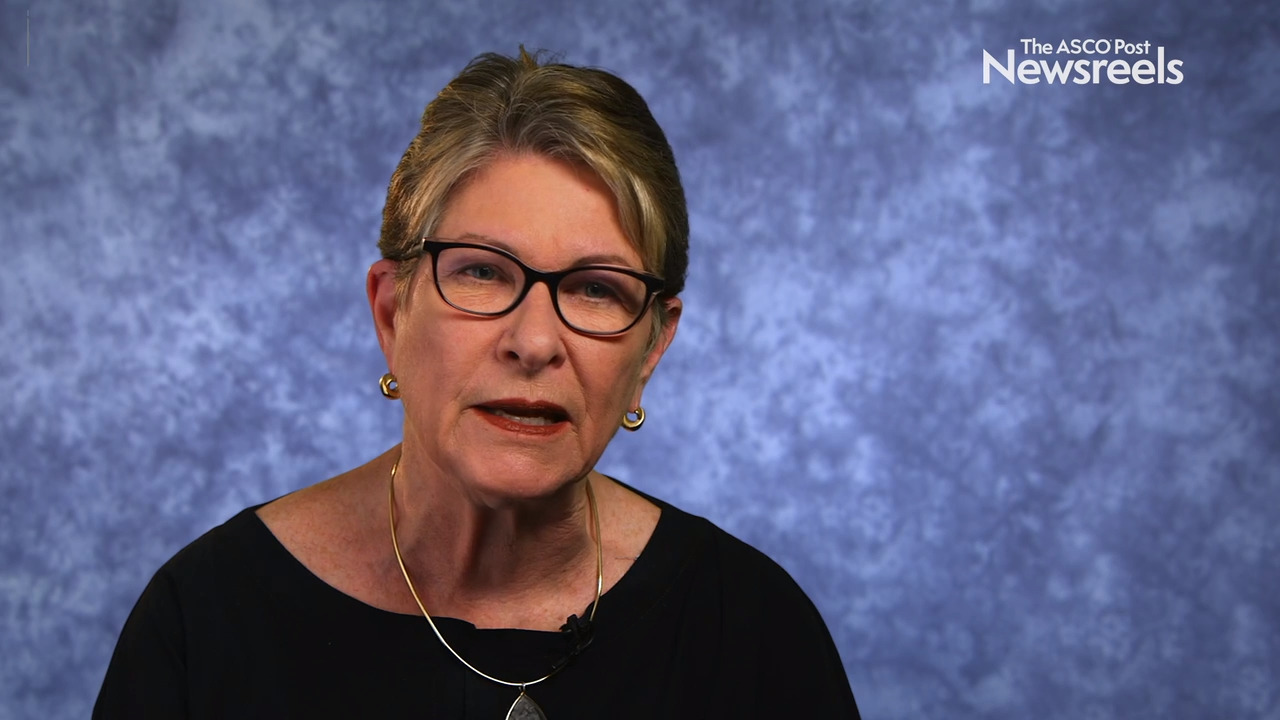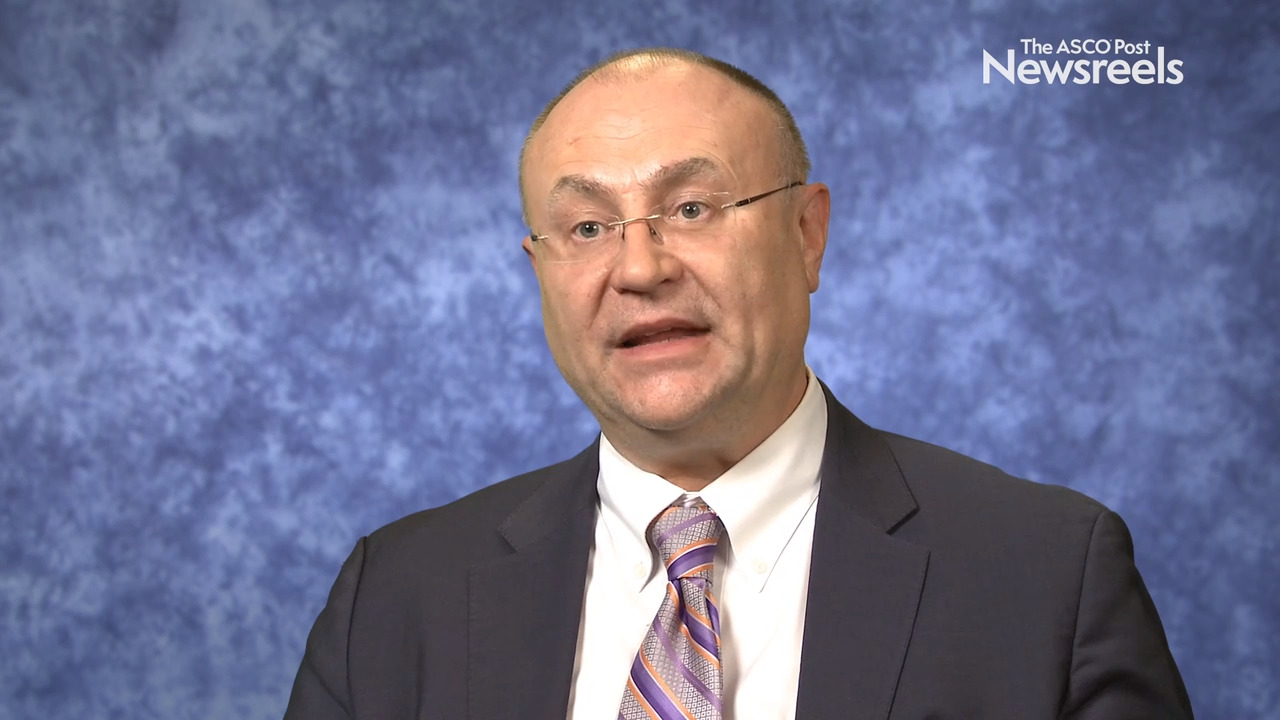2019 ASCO: POLO: Maintenance Olaparib in Germline BRCA-Mutated Pancreatic Cancer
The randomized phase III POLO trial found that maintenance therapy with the poly (ADP-ribose) polymerase inhibitor olaparib significantly delayed the progression of metastatic pancreatic cancer in patients with germline BRCA gene mutations compared with placebo (median...
Alok A. Khorana, MD, and Hedy L. Kindler, MD, on Metastatic Pancreatic Cancer: POLO Trial on Olaparib as Maintenance Therapy
Alok A. Khorana, MD, of the Cleveland Clinic, and Hedy L. Kindler, MD, of The University of Chicago, discuss phase III findings on olaparib as maintenance treatment following first-line platinum-based chemotherapy in patients with metastatic pancreatic cancer and a germline BRCA mutation (Abstract LBA4).
Expect Questions About Screening for Pancreatic Cancer
Although the detection of pancreatic cancer at early stages would offer an improved chance for successful treatment and survival, symptoms of pancreatic cancer are usually vague or absent, and screening to detect pancreatic cancer earlier is not recommended for average-risk asymptomatic patients....
Lifestyle Modifications and Screening of Patients at High Risk Can Reduce Deaths From Pancreatic Cancer
After disclosing that he had been diagnosed with stage IV pancreatic cancer, Alex Trebek, longtime host of the popular television game show Jeopardy!, vowed that he would beat the disease despite the low associated survival rate. His statement has brought pancreatic cancer back into the public...
Study Shows Rucaparib Active as Maintenance Therapy in Pancreatic Cancer
The poly (ADP-ribose) polymerase (PARP) inhibitor rucaparib holds promise as maintenance therapy for advanced, platinum-sensitive, BRCA- or PALB2-mutated pancreatic cancer, according to an interim analysis of an ongoing phase II clinical trial presented at the 2019 Annual Meeting of the American...
ASCO Clinical Opinion Recommends Germline Testing for All Patients With Pancreatic Cancer
The recently released ASCO Clinical Practice Provisional Clinical Opinion on Evaluating Susceptibility to Pancreatic Cancer highlights the importance of emerging data indicating a relatively high rate of germline mutations in pancreatic cancer.1 Recent studies have demonstrated that up to 1 in 10...
NCCN Clinical Practice Guidelines in Oncology: 2019 Updates
In 1996, the National Comprehensive Cancer Network® (NCCN®) published its first set of Clinical Practice Guidelines in Oncology (NCCN Guidelines®), covering eight tumor types. NCCN Guidelines are now published for more than 70 tumor types and topics. Some of the key updates for 2019 were presented...
Study Finds Immune Enrichment Improves Outcomes in Pancreatic Cancer With Activated but Not Normal Stroma
ALTHOUGH IMMUNOTHERAPIES have had limited success in pancreatic cancer to date, findings from a molecular analysis of the tumor microenvironment suggest that certain subtypes may be more responsive to treatment. According to data presented at the 2019 Society of Surgical Oncology Annual Cancer...
AACR Study Presentations Include New Data in Breast and Prostate Cancers, Sarcoma, and High-Risk Individuals
THE 2019 American Association for Cancer Research (AACR) Annual Meeting was held March 29 to April 3 in Atlanta. In addition to our regular coverage of news stories from the meeting, here are some brief highlights of additional noteworthy studies. Stage IV HER2-Positive Breast Cancer: Surgery or No ...
Single Nucleotide Polymorphisms and Survival After Pancreatic Cancer Resection
In a study reported in JAMA Surgery, Dimitrakopoulos et al found two single nucleotide polymorphisms (SNPs) in noncoding, functional regions of genes that regulate cancer progression. They were associated with survival after resection of pancreatic ductal adenocarcinoma. The study involved...
Factors Contributing to Improved Survival Following Total Neoadjuvant Therapy for Borderline/Locally Advanced Pancreatic Cancer
A newly published Mayo Clinic study has found that a presurgery treatment plan for patients with borderline/locally advanced pancreatic cancer undergoing total neoadjuvant therapy may improve outcomes. The findings were published by Truty et al in Annals of Surgery. The study followed 194...
VISTA Checkpoint Implicated in Pancreatic Cancer Immunotherapy Resistance
Researchers have identified a new potential immunotherapy target in pancreatic cancer, which so far has been notoriously resistant to treatment with immune checkpoint blockade drugs effective against a variety of other cancers. A research team from The University of Texas MD Anderson Cancer Center...
Trends in Neoadjuvant Therapy for Resectable Pancreatic Cancer
SEVERAL STUDIES at the 2019 Gastrointestinal Cancers Symposium evaluated the benefits of neoadjuvant treatment in patients with pancreatic cancer—and in patients deemed fully resectable, not just “borderline” resectable.1-3 Although the standard of care for resectable pancreatic ductal...
AACR 2019: Maintenance Rucaparib Treatment in BRCA- or PALB2-Mutated Pancreatic Cancer
Maintenance treatment with the PARP inhibitor rucaparib was well tolerated and showed activity among patients with advanced BRCA- or PALB2-mutated pancreatic cancer sensitive to platinum-based chemotherapy, according to results from an interim analysis of an ongoing phase II clinical...
AACR 2019: Higher BMI Before Age 50 May Increase Risk of Pancreatic Cancer
A higher body mass index (BMI) before age 50 may be more strongly associated with pancreatic cancer mortality risk than excess weight at older age, according to the results of a study presented by Jacobs et al at the American Association for Cancer Research (AACR) Annual Meeting 2019 (Abstract...
Germline Mutations and Risk for Neoplastic Disease Progression During Pancreatic Surveillance
In a study reported in the Journal of Clinical Oncology, Abe et al found previously unidentified deleterious germline mutations in patients with family history as the basis for pancreatic surveillance. Moreover, the study showed the risk of pancreatic cancer was higher in individuals with germline...
AACR 2019: CD40 Antibody Combined With Chemotherapy in Advanced Pancreatic Cancer
An interim analysis of a small phase Ib study by O’Hara et al evaluating the CD40 agonistic monoclonal antibody APX005M in combination with gemcitabine and nab-paclitaxel with or without the programmed cell death protein 1 (PD-1) inhibitor nivolumab in untreated patients with metastatic...
Margaret A. Tempero, MD, on Pancreatic Cancer: NCCN Guidelines Updates
Margaret A. Tempero, MD, of the UCSF Helen Diller Family Comprehensive Cancer Center, discusses new adjuvant therapy options for patients with pancreatic cancer, and germline testing, including testing for microsatellite instability/mismatch repair genes as well as molecular analysis of all tumors.
Addition of Pegylated Recombinant Human Hyaluronidase to FOLFIRINOX in Metastatic Pancreatic Adenocarcinoma
In the phase I/II SWOG S1313 trial, which was reported in the Journal of Clinical Oncology by Ramanathan et al, researchers found that the addition of pegylated recombinant human hyaluronidase (PEGPH20) to modified (m) FOLFIRINOX (fluorouracil, leucovorin, irinotecan, and oxaliplatin) worsened...
The Pancreatic Cancer Collective Awards $7 Million to Teams of Researchers in Pancreatic Cancer
The Pancreatic Cancer Collective—the strategic partner of the Lustgarten Foundation and Stand Up To Cancer (SU2C)—has awarded a total of $7 million in first-round New Therapies Challenge grants to 7 teams of top cancer researchers to explore new pancreatic cancer treatments. Each team will receive...
Mutations in DNA Damage Repair Predict Benefit With Platinum Agents in Pancreatic Cancer
Patients with advanced pancreatic cancer who have homologous repair damage response mutations may derive considerable benefit from treatment with platinum agents, according to an analysis of patients in the Know Your Tumor Program presented by Michael Pishvaian, MD, PhD, of Georgetown University,...
Expert Point of View: Andrew X. Zhu, MD, PhD
ANDREW X. ZHU, MD, PhD, of Massachusetts General Hospital Cancer Center and Harvard Medical School, noted that Prep-02/ JSAP-05 is the first study to show the value of neoadjuvant chemotherapy in patients with resectable pancreatic adenocarcinoma. However, the findings are applicable only to Asian ...
Emerging Role for Neoadjuvant Treatment of Resectable Pancreatic Cancer
SEVERAL STUDIES presented at the 2019 Gastrointestinal Cancers Symposium evaluated the benefits of neoadjuvant treatment in patients with pancreatic cancer—and in patients deemed fully resectable, not just “borderline” resectable.1-3 Although the standard of care for resectable pancreatic ductal...
FDA Pipeline: Treatments for Tenosynovial Giant Cell Tumor and Pancreatic Cancer, Plus a Statement on Breast Implant–Associated Lymphoma
The U.S. Food and Drug Administration (FDA) recently granted the following designations and applications and also issued a statement: Priority Review for Pexidartinib in Tenosynovial Giant Cell Tumor The FDA has accepted a new drug application (NDA) and granted Priority Review for pexidartinib...
Enhancing Patient Outcomes After Whipple Procedure
Pancreaticoduodenectomy, or the Whipple procedure, is one of the most complex abdominal surgeries, and is commonly prescribed as a first line of therapy for cancer located within the pancreatic head. Investigators reported that following a 5-day accelerated recovery pathway after surgery helped to...
Andrew X. Zhu, MD, PhD, on Pancreatic Cancer: Results From the Prep-02/JSAP-05 Trial
Andrew X. Zhu, MD, PhD, of the Massachusetts General Hospital Cancer Center, discusses phase II/III study findings on neoadjuvant chemotherapy with gemcitabine and S-1 vs upfront surgery for resectable pancreatic cancer (Abstract 189).
Heinz-Josef Lenz, MD, on Pancreatic Cancer Tumor Profiling and Treatment Response: Results From the COMPASS Trial
Heinz-Josef Lenz, MD, discusses molecular profiling and response to chemotherapy in the COMPASS study, which was designed to evaluate the feasibility of using genomic sequencing in pancreatic cancer care (Abstract 188).
2019 GI Cancers Symposium: Neoadjuvant Chemotherapy vs Upfront Surgery in Resectable Pancreatic Cancer
A phase II/III trial presented by Unno et al at the 2019 Gastrointestinal Cancers Symposium (Abstract 189) sought to compare neoadjuvant chemotherapy (using gemcitabine and the oral fluoropyrimidine combination of tegafur/gimeracil/oteracil [S-1]) to upfront surgery in patients with histologic ...
VISTA Checkpoint Implicated in Pancreatic Cancer Immunotherapy Resistance
Researchers have identified a new potential immunotherapy target in pancreatic cancer, which so far has been notoriously resistant to treatment with immune checkpoint blockade drugs effective against a variety of other cancers. A research team from The University of Texas MD Anderson ...
FDA Pipeline: Designations for Treatments of Graft-vs-Host-Disease, Colorectal Cancer, Pancreatic Cancer, and More
The U.S. Food and Drug Administration (FDA) recently issued the following new designations and clearances: Fast Track Designation for Itolizumab for the Treatment of Acute Graft-vs-Host Disease The FDA granted Fast Track designation to itolizumab for the treatment of acute graft-vs-host ...
Adjuvant FOLFIRINOX vs Gemcitabine in Pancreatic Cancer
In a phase III Canadian and French trial reported in The New England Journal of Medicine, Conroy and colleagues in the Canadian Cancer Trials Group and the Unicancer-GI–PRODIGE Group found that adjuvant modified FOLFIRINOX (fluorouracil, leucovorin, irinotecan, oxaliplatin) produced better...
FDA Pipeline: What’s New in Biosimilars, Drug Reviews, Designations, and More
The U.S. Food and Drug Administration (FDA) recently issued the following new approvals and designations: Approval for Pegfilgrastim Biosimilar The FDA recently approved a pegfilgrastim biosimilar, pegfilgrastim-cbqv (Udenyca). The biosimilar has been approved to decrease the incidence...
Assessment of the 8th Edition of the AJCC TNM Staging System in Cohort With Resected Pancreatic Cancer
In a study reported in JAMA Surgery, van Roessel et al found that the recently released 8th edition of the American Joint Committee on Cancer (AJCC) tumor-node-metastasis (TNM) staging system for pancreatic cancer provided better distribution among cases and some increase in prognostic...
Neoadjuvant Therapy, Changes in Body Composition, and Resectability in Pancreatic Cancer
In a retrospective cohort study reported in JAMA Surgery, Carlos Fernández-del Castillo, MD, of the Department of Surgery, Massachusetts General Hospital, Harvard Medical School, and colleagues found that neoadjuvant therapy in patients with pancreatic ductal adenocarcinoma was associated with...
Protein-Metabolite Panel for Detection of Early-Stage Pancreatic Cancer
In a study reported in the Journal of the National Cancer Institute, Fahrmann et al developed and validated a plasma-derived metabolite panel that distinguished early-stage pancreatic ductal adenocarcinoma (PDAC) with high accuracy. Accuracy was further improved with the addition of a previously...
Association of Immunologic Markers With Survival in Upfront Resectable Pancreatic Cancer
In a research letter published in JAMA Surgery, Tang et al found that higher levels of intratumoral CD3-positive T cells and postoperative circulating monocyte counts were associated with improved survival in patients with upfront resectable pancreatic ductal adenocarcinoma. The prospective cohort ...
FDA Grants Breakthrough Device Designation for Cancer Detection Liquid Biopsy
PapGene, Inc, has announced their cancer detection test has received Breakthrough Device designation from the Center for Devices and Radiological Health (CDRH) of the U.S. Food and Drug Administration (FDA). The PapGene test is a multianalyte test that uses a combination of circulating tumor DNA...
Large Disparities in Cancer Mortality Rates Found Among Different Racial/Ethnic Populations in New York State
According to the American Cancer Society, cancer is the leading cause of death for Hispanics and Asian/Pacific Islanders in the United States. However, their cancer burden is less than that of non-Hispanic whites and especially non-Hispanic blacks, who bear the most disproportionate share of the...
Preliminary Data Suggest Neoadjuvant Chemoradiotherapy May Improve Outcomes in Patients With Early Stages of Pancreatic Cancer
For patients with newly diagnosed, potentially resectable pancreatic cancer, neoadjuvant chemoradiotherapy led to better outcomes when compared with immediate surgery followed by chemoradiotherapy in the phase III PREOPANC-1 trial. Approximately 25% fewer deaths occurred among patients in the...
Early Study Shows Elasticity of Cancer Cells May Determine Where Pancreatic Cancer Metastases Form
Pancreatic cancer often metastasizes to the liver or lungs. The prognosis is better for patients with metastases in the lungs. However, the organ that is more likely to be affected depends on the cancer cells’ ability to alter their characteristics and shape—as a research team at the...
Study Finds Inherited Gene Variants in 10% of Patients With Pancreatic Cancer
A large study of pancreatic cancer patients found that almost 10% harbored inherited genetic variations or mutations that may have increased their susceptibility to the disease. At the same time, some of these mutations were associated with more favorable responses to certain chemotherapy agents,...
Actively Recruiting Clinical Trials Focused on Pancreatic Cancer
THE INFORMATION contained in this Clinical Trials Resource Guide includes actively recruiting clinical studies focused on pancreatic cancer. These studies are investigating radiotherapy; cancer vaccines; combination treatments; novel cell therapies; response prediction; and more. All of the studies ...
Adjuvant Modified FOLFIRINOX Yields Unprecedented Survival in Pancreatic Cancer
Adjuvant treatment with modified FOLFIRINOX resulted in the longest overall survival yet reported for patients with resected pancreatic cancer, according to the results of the phase III Unicancer GI PRODIGE 24/CCTG PA.6 trial, presented at the 2018 ASCO Annual Meeting.1 With adjuvant modified...
Total Neoadjuvant Therapy for Borderline Resectable Pancreatic Adenocarcinoma
In a single-institution phase II trial reported in JAMA Oncology, Murphy et al found that total neoadjuvant therapy with FOLFIRINOX (fluorouracil [5-FU], irinotecan, and oxaliplatin) and individualized chemoradiotherapy was associated with a high R0 resection rate and good outcomes in patients with ...
Study Finds Recent-Onset Type 2 Diabetes May Be Early Manifestation of Pancreatic Cancer
According to the American Cancer Society, pancreatic cancer is one of the most deadly cancers, with an overall 5-year survival rate of just 8%, mainly because the vast majority of patients, about 80%, are diagnosed at a late stage of disease. Research has shown that identification of high-risk ...
Using Neoadjuvant Therapy to Reduce Early Recurrences, Increase Survival in Patients With Pancreatic Cancer
USE OF THE FOLFIRINOX regimen (fluorouracil, leucovorin, irinotecan, and oxaliplatin) was associated with a 4.9-month improvement in overall survival compared to gemcitabine/ nab-paclitaxel (Abraxane) in the neoadjuvant treatment of resectable and borderline-resectable pancreatic head...
Henry Ford Health System Announces Launch of Pancreatic Cancer Center
The Henry Ford Health System announced the receipt of a $20 million gift (from an individual donor who wishes to remain anonymous) to launch the Henry Ford Pancreatic Cancer Center, which will focus on global collaborations to develop new methods for the early detection of pancreatic cancer. David ...
Thierry Conroy, MD, on Pancreatic Cancer: Results From the PRODIGE 24 Trial
Thierry Conroy, MD, of the Institut de Cancérologie de Lorraine, discusses phase III study findings on adjuvant mFOLFIRINOX vs gemcitabine in patients with resected pancreatic ductal adenocarcinomas (Abstract LBA4001).
Geertjan van Tienhoven, MD, PhD, on Pancreatic Cancer: Results From the PREOPANC-1 Trial
Geertjan Van Tienhoven, MD, PhD, of the Dutch Pancreatic Cancer Group, discusses phase III study findings on preoperative chemoradiotherapy vs immediate surgery for resectable and borderline resectable pancreatic cancer (Abstract LBA4002).
2018 ASCO: PREOPANC-1 Trial Compares Preoperative Chemoradiotherapy vs Immediate Surgery for Pancreatic Cancer
A randomized, phase III trial found that patients who received chemoradiotherapy before pancreatic cancer surgery had better disease-free survival than those who started their treatment with surgery, which is the current standard of care. In addition, the 2-year survival rate was higher for those...






